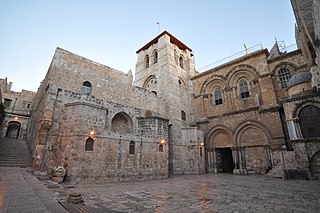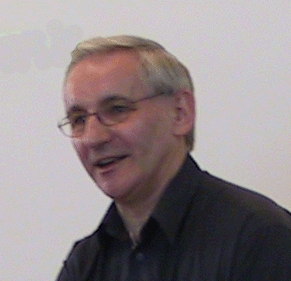Related Research Articles

Christianity is an Abrahamic monotheistic religion based on the life and teachings of Jesus of Nazareth. It is the world's largest and most widespread religion with roughly 2.4 billion followers representing one-third of the global population. Its adherents, known as Christians, are estimated to make up a majority of the population in 157 countries and territories. They believe that Jesus is the Son of God, whose coming as the Messiah was prophesied in the Hebrew Bible and chronicled in the New Testament.

Judaism is an Abrahamic, monotheistic, and ethnic religion. It comprises the collective spiritual, cultural, and legal traditions of the Jewish people, having originated as an organized religion in the Middle East during the Bronze Age. Contemporary Judaism evolved from Yahwism, the cultic religious movement of ancient Israel and Judah, around the 6th/5th century BCE, and is thus considered to be one of the oldest monotheistic religions. Religious Jews regard Judaism as their means of observing the Mosaic covenant, which was established between God and the Israelites, their ancestors. Jewish religious doctrine encompasses a wide body of texts, practices, theological positions, and forms of organization.
A mosque or masjid is a place of prayer for Muslims. Mosques are usually covered buildings, but can be any place where prayers (salah) are performed, including outdoor courtyards.

Prayer is an invocation or act that seeks to activate a rapport with an object of worship through deliberate communication. In the narrow sense, the term refers to an act of supplication or intercession directed towards a deity or a deified ancestor. More generally, prayer can also have the purpose of thanksgiving or praise, and in comparative religion is closely associated with more abstract forms of meditation and with charms or spells.

Zulu people are a Nguni ethnic group native to Southern Africa. The Zulu people are the largest ethnic group and nation in South Africa, with an estimated 10–12 million people, living mainly in the province of KwaZulu-Natal.
Zulu traditional religion consists of the beliefs and spiritual practices of the Zulu people of southern Africa. It contains numerous deities commonly associated with animals or general classes of natural phenomena.

Traditional healers of Southern Africa are practitioners of traditional African medicine in Southern Africa. They fulfill different social and political roles in the community like divination, healing physical, emotional, and spiritual illnesses directing birth or death rituals, finding lost cattle, protecting warriors, counteracting witchcraft and narrating the history, cosmology, and concepts of their tradition.

Kneeling is a basic human position where one or both knees touch the ground. Kneeling is defined as “to position the body so that one or both knees rest on the floor,” according to Merriam-Webster. Kneeling when only composed of one knee, and not both, is called genuflection.
Zionist churches are a group of Christian denominations that derive from the Christian Catholic Apostolic Church, which was founded by John Alexander Dowie in Zion, Illinois, at the end of the 19th century. Missionaries from the church came to South Africa in 1904 and among their first recruits were Pieter Louis le Roux and Daniel Nkonyane of Wakkerstroom who continued to evangelize after the Zionist missionaries left in 1908.
An African-initiated church (AIC) is a Christian church independently started in Africa by Africans rather than chiefly by missionaries from another continent.

Irving R. Hexham is an English-Canadian academic who has published twenty-three books and numerous articles, chapters, and book reviews. Currently, he is Professor of Religious Studies at the University of Calgary, Alberta, Canada, married to Karla Poewe who is Professor Emeritus of Anthropology at the University of Calgary, and the father of two children. He holds dual British and Canadian citizenship.

Prostration is the gesture of placing one's body in a reverentially or submissively prone position. Typically prostration is distinguished from the lesser acts of bowing or kneeling by involving a part of the body above the knee, especially the hands, touching the ground.

The Nazareth Baptist Church is the second largest African initiated church based in South Africa, founded in 1910.

Religion in South Africa is dominated by various branches of Christianity.

Isaiah Mloyiswa Mdliwamafa Shembe, was a self-proclaimed prophet and the founder of the Ibandla lamaNazaretha, South Africa, which was the largest African-initiated church in Africa during his lifetime. Shembe started his religious career as an itinerant evangelist and faith healer in 1910. Within ten years, he had built up a large following in Natal with dozens of congregations across the province.

Christianity is the most widely professed religion in Zimbabwe, with Protestantism being its largest denomination.

Christianity is the largest religion in Tanzania, with a substantial Muslim minority. Smaller populations of Animists, practitioners of other faiths, and religiously unaffiliated people are also present.

Christianity is the dominant religion in Lesotho, with Protestantism and Catholicism being its main denominations.
A debtera is an itinerant religious figure in the Ethiopian and Eritrean Orthodox Tewahedo Churches, and the Beta Israel, who sings hymns and dances for churchgoers, and who performs exorcisms and white magic to aid the congregation. A debtera will claim an ecclesiastical identity and behave as in minor orders. They may in fact be officially ordained as deacons, or may act outside the Church hierarchy. They are usually feared by the local population.

Ukusina is a type of traditional dance that has its roots in South Africa's coastal region. For the Zulu people, it is an expressive and rhythmic dance form with deep cultural importance. The Ukusina requires dancers to kick their legs in any direction up and out, and then stamp each foot into the ground. The majority of the time, this dance is performed for entertainment during social occasions such as wedding ceremony. Ukusina dances, as a result, are socially created and center on the song leader singing interlocking word phrases. Traditionally, it was thought that no religious event would be complete without at least one ukusina dance performance. Ukusina dance is a fundamental component of the social, religious, and cultural life of the Zulu people, as evidenced by the descriptions of traditional dances in South Africa. Everyone in attendance is drawn into a coherent action atmosphere by the intimate relationship between body movement and music.
References
- ↑ Hodgson, Janet (1982). The God of the Xhosa: A Study of the Origins and Development of the Traditional Concepts of the Supreme Being. Oxford University Press. p. 80. ISBN 978-0-19-570315-3.
- ↑ Berglund, Axel-Ivar. "Communion with the shades in traditional Zulu society". Missionalia : Southern African Journal of Mission Studies. 1 (2). Retrieved 9 October 2023.
- ↑ Peta, Sanelisiwe. "Women, religion and landscape : reimagining traditional religious spaces of the Shembe church from Afrocentric notions of the female body". ujcontent.uj.ac.za. Retrieved 9 October 2023.
- ↑ Shange, Nombulelo Tholithemba (2014). "Shembe religion's integration of African traditional religion and Christianity : a sociological case study" . Retrieved 9 October 2023.
- ↑ Oosthuizen, Gerhardus Cornelis (1979). Afro-Christian Religions. BRILL. p. 28. ISBN 978-90-04-05999-3.